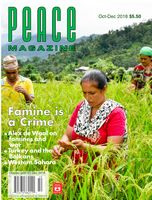
Peace Magazine Oct-Dec 2018, page 16. Some rights reserved.
Search for other articles by Stephen Zunes here
Western Sahara remains as Africa’s last colony and a challenge to the international community
Nearly 43 years after seizing the Spanish colony of Western Sahara on the verge of its promised independence, Morocco continues its brutal occupation of its southern neighbor. Recognized by the international community as a non-self-governing territory under a foreign belligerent occupation, it remains as Africa’s last colony and a challenge to the international community in upholding such fundamental principles as the right of self-determination and the ban on territorial conquest.
In addition, Morocco has failed to live up to the terms of the 1991 UN-supervised ceasefire agreement with the Polisario Front—a secular nationalist movement that waged an armed struggle against Spanish colonialists and later against Moroccan occupiers—which called for a free and fair referendum by the people of Western Sahara on the fate of the territory. A series of resolutions by the UN Security Council and the UN General Assembly, as well as a landmark 1975 advisory ruling by the International Court of Justice, have reaffirmed the right of the people of Western Sahara to self-determination.
However, France and, at times, the United States have blocked the Security Council from enforcing its resolutions as part of their perceived need to strengthen the Moroccan monarch. This trading partner was seen as a bulwark against Communism and radical Arab nationalism during the Cold War and, more recently, as an important ally in the struggle against Islamist extremism.
To escape political repression, nearly half of the Western Sahara population lives in refugee camps in neighboring Algeria. The traditionally nomadic peoples of the territory have long cherished their independence. They have never been formally part of Morocco, have their own distinct dialect and customs, and practice a relatively liberal interpretation of Islam more respectful of political pluralism and women’s rights than in most neighboring countries.
As an alternative to a referendum, Morocco has been pushing a plan for limited autonomy. The proposal has received strong support from a number of Morocco’s allies, particularly France and the United States. However, not only is the Moroccan autonomy plan extremely limited in its scope, it falls well short of what is required in bringing about a peaceful resolution to the conflict. It works on the assumption that Western Sahara is part of Morocco, a contention that has long been rejected by the United Nations, the World Court, the African Union, and a broad consensus of international legal opinion.
International opposition to the autonomy plan is based on concern that, for the first time since the ratification of the UN Charter more than 70 years ago, the international community would be endorsing the expansion of a country’s territory by military force, thereby establishing a dangerous and destabilising precedent.
The Polisario is still pressing for a referendum on outright independence. While honoring the ceasefire, Western Saharans within the occupied territory have been engaging in waves of largely nonviolent resistance, though severe repression by Moroccan occupation forces and the presence of Moroccan settlers—who now outnumber the indigenous population—has limited its effectiveness.
Just as the US veto power in the Security Council has made it impossible for the United Nations to enforce its resolutions regarding Israel and allowing for Palestinian self-determination, France and the United States have played a similar role in protecting Morocco from living up to its international responsibilities. And, just as civil society groups have taken initiatives against the Israeli occupation through the campaign in support of boycotts, divestment, and sanctions (BDS), similar campaigns have been launched in Europe and elsewhere in support of Western Sahara.
In the comparable case of East Timor, it was only after activists in the United States, Canada, Great Britain and Australia pressured their governments to stop supporting Indonesia’s occupation that the Jakarta regime finally offered a referendum which gave the East Timorese their right to self-determination. It may take similar grassroots campaigns in Europe and North America to ensure that western powers live up to their international legal obligations and pressure Morocco to let the people of Western Sahara determine their own destiny.
Stephen Zunes is an American international affairs analyst and author of the book, Western Sahara.

Peace Magazine Oct-Dec 2018, page 16. Some rights reserved.
Search for other articles by Stephen Zunes here